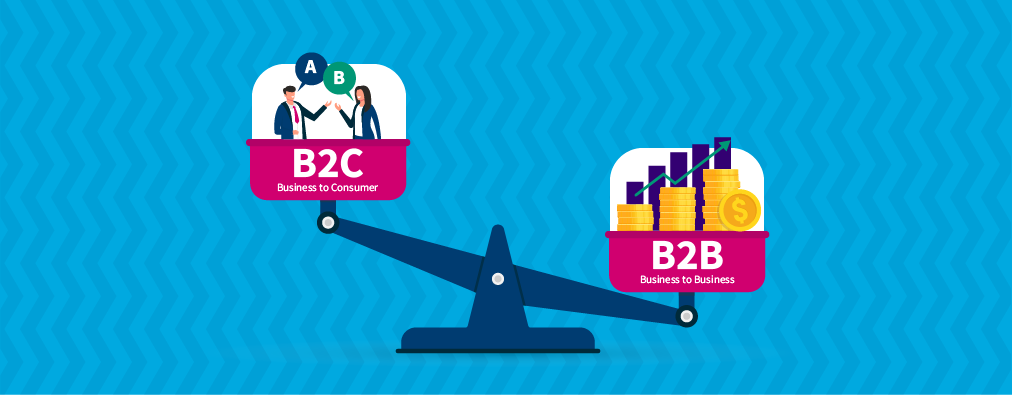Five useful B2B marketing tips in a time of stress
September 16, 2022
By Dave Jagodowski
March 8, 2024

Many small and medium-sized businesses see the business-to-consumer (B2C) marketplace as their main marketing battleground because they know that individual consumers make up their largest customer base. More and more businesses, however, are looking for opportunities in the business-to-business (B2B) space.
They have some pretty convincing reasons. In this article, we explore four of them.
This case study illustrates the key difference between B2C and B2B:
An education company markets a series of video tutorials through an online learning marketplace. Individuals purchase licenses to access the tutorials online. The company provides any necessary customer service. Selling individual licenses to individual customers is textbook B2C.
After some time, however, the tutorials catch the attention of a university that wants to incorporate them into their course offerings. They offer to buy 1,000 licenses each year and take care of the student support. Because the university is now the customer, this is a B2B relationship.
It can be quite a shift to go from marketing to individuals to targeting companies. So why are so many companies looking to do it? Here are some benefits that the B2B marketplace offers those with the right products and services to pursue it.
 One of the most intriguing reasons for moving into the B2B market is the increased revenue potential. B2B transactions have larger contract values compared to individual consumer sales, leading to a direct revenue spike.
One of the most intriguing reasons for moving into the B2B market is the increased revenue potential. B2B transactions have larger contract values compared to individual consumer sales, leading to a direct revenue spike.
The recurring nature of B2B transactions also means a single B2B contract can offer a consistent income source over time, bringing stability to revenue projections. Furthermore, since business clients tend to focus more on long-term savings, they are often willing to invest in or partner with companies that can provide quality services or products that will help them improve their own operations.
Moving into the B2B market isn't just about bigger deals. It's also a way to build strong business relationships. Unlike the often-transactional nature of selling to individual consumers (that you may or may not see again), B2B clients present an opportunity for a lasting, mutually beneficial partnership. Businesses value trust and reliability, so if you can deliver dependable value over time, you can expect repeat business, referrals, and other growth opportunities to follow.
The B2B market promotes and rewards specialization in ways that the consumer market simply cannot. By adapting your product or service to focus on meeting the needs of a target business audience, you can help companies establish a unique position for themselves, build their brand, and improve their market share. Although these niches may seem small compared to broader consumer markets, they offer valuable opportunities for your business to gain client trust and secure your future with them.
Fluctuations in consumer demand can make sales forecasting in the B2C world challenging and unpredictable. Individuals often make impulsive purchases based on emotion or around certain holidays. In B2B, however, the sales cycles are much longer and more predictable due to the meticulous planning and consideration that goes into purchasing decisions. This predictability flattens out the “sales spikes” you find in the consumer market and allows for improved inventory management, optimized production planning, and better anticipation of order upticks. As a result, businesses can operate more efficiently and with greater foresight.

The benefits of shifting to the B2B market are enticing, but the path isn't without its potholes. Transitioning to a B2B model requires a deep understanding of your new target market. You’ll likely need to adapt or change your product offerings, sales strategy, and marketing tactics to succeed in the B2B space. There’s a definite learning curve, and it may require some internal restructuring as well.
Best advice? Don’t go it alone.
Consider hiring a dedicated consultant who can help you develop a business plan and pave the way for the transition. When you’re ready to pull the trigger, hire a creative agency that specializes in B2B marketing to help you develop the correct messaging, build up corporate trust in your brand, and get your name in front of the right potential clients.
Businesses that meet the obstacles head-on, armed with strategic planning and thorough market analysis, stand a better chance of success. Whether you're contemplating a full-scale pivot or a supplementary expansion into the B2B realm, one thing is clear: Opportunities abound for businesses willing to put in the work.
We take pride in a team loaded with smarts, wit, and ideas. If you'd like to have a smarter, wittier inbox filled with ideas each month, subscribe here to the MarketReach Blog, and we will let you know when there is something new you might like!

Need us now? Just want to learn more? We’d love to talk.